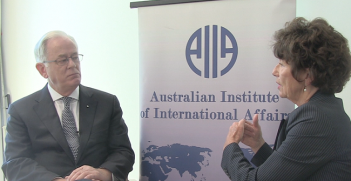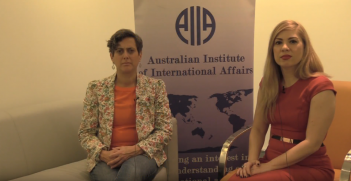Interview with Richard Goyder AO, Chair of the B20
As the B20 meeting starts today, Chair of the B20 Richard Goyder discusses human capital, changing workplace skills and youth employment.
Interview by Martina Učníková
Mr Goyder, you will be chairing this year’s B20 Summit. How would you sum up its role in Brisbane’s upcoming G20?
The B20 is the business advisory group set up to provide input into the G20 – the 19 biggest economies the world and the European Union. It’s primarily an economic group. While it was formed some time ago, it really came into its own during the Global Financial Crisis. Foremost, the purpose of the G20 leaders coming together is looking at agreed economic actions and policies that can lead to growth and the creation of jobs. While there are a number of other groups, such as civil society (C20), labour (L20) and youth (Y20), the role of the B20 is to provide governments with recommendations on economic policy.
Can you tell us a little bit more about the Australian B20 Summit and why it’s needed?
In our case, as it’s Australia hosting the G20 in Brisbane in November, we’ll provide the Australian government with recommendations. Our leadership group consists of about 20 senior business people, then we’ve got four main taskforces and another group working across other areas.
Along with about 400 international business people and the CEO council, all up, we’ve got a global network of around 500-600 people that we’re using to help us formulate these recommendations. We come together in Sydney in July at the Australian B20 Summit, where we’ll debate the taskforce recommendations and then submit our recommendations to the Prime Minister. Our hope this year is that the G20 has a very narrow focus which is firmly focused on the agendas of growth and jobs. We hope that our recommendations find their way into the G20 Leaders’ discussions and that, ultimately, some of our recommendations will be agreed upon.
Can you elaborate on the four different taskforces? Starting with the Trade one.
Yes. The Trade taskforce is headed up by Andrew McKenzie, CEO of BHP Billiton. It’s about a continuation of more work on trade facilitation; some of the behind-the-border restrictions on trade are far more of a barrier than the actual trade policies that are in place – for instance, tariffs and those things. This will be a continuation of the work to free that up and there was some good progress in Bali late last year on that.
And what about Infrastructure?
The Australian B20’s Infrastructure taskforce is helmed by David Thodey, who is Telstra’s CEO. There is currently a $30 trillion infrastructure deficit spend around the globe, and we want to open that up, think about whether these projects create economic growth and jobs, and also whether the infrastructure itself will improve productivity once it’s in place. There is a massive opportunity in infrastructure.
Explain a little about the B20’s Financing for Growth taskforce.
This taskforce is led by Mike Smith, CEO of ANZ bank. We want to have a look at where we are in terms of regulation, and whether there have been unintended consequences of processes or regulations that have been put in place post-GFC that are now an impediment to money flowing to some of these projects. I hasten to add that we still agree that all the Basel III recommendations should be implemented, but we should also say let’s assess where we are at with them.
Lastly, how about Human Capital?
The Human Capital taskforce is headedup by David Sargent, CEO of GE inAustralia and New Zealand. And when I say“headed up”, they are the coordinating chairsof their taskforce – there are other co-chairs from other countries, so there’s a really goodrepresentation from around the globe. On thehuman capital front, there are a number ofthings going on. Like the mismatch betweenthe needs of employers and the requirementsof skills in the workforce versus what oureducational institutions are turning out. Weoften talk about trade barriers but there’s alsoa barrier to human capital. For example, weknow that in regions of the world where thereis chronic unemployment, particularly youthunemployment, there are other places in theworld that through digital technology and other ways could be employing these people.But there are a whole bunch of barriers inplace that don’t allow that to happen.
There’s also a B20 function group focused specifically on transparency and anti-corruption, is that right?
Correct. It’s headed up by Michael Andrew, the former Global Head of KPMG. We see transparency and anti-corruption bridging all four of the task forces, as it’s a fundamental and key plank in any business conducting anything, anywhere.
With regards to human capital, a recent Oxford Martin School study speculates that about 47 per cent of jobs would be open to automation in the next 20 years. This is obviously observed as jobless growth which is recognised as a consequence of underdevelopment in the workplace. These fundamental changes to the workplace require certain responses to ensure that work for modernisation is not going to result in increasing unemployment. How do you think the B20 can best address some of these issues?
I think trying to put in place policies that fix that is the wrong way to go. What should be put in place are policies that encourage economic growth, and then leave it to the entrepreneurs and the business people to take advantage of policies that promote growth, investment and risk-taking. I think you’re absolutely right on technology – there are a number of areas where technology will, by its very nature, take out jobs. Nevertheless, there are huge jobs being created at some of these technology companies now as well. Amazon, Google and Apple are examples of this. We shouldn’t fear that. We should say that change is part of the economic environment. We’ve got to make sure that in terms of human capital we have an education system that is educating people for the roles that are going to be required, and I think we have to be far more flexible on transfer of human capital around the globe.
Seeing you mention the transfer of human capital, that ties in really well with freeing trade and services. Looking at Australia, we have a number of free-trade agreements (FTAs) in South-East Asia in the works. Do you think these go far enough?
I think in a general sense this is a great year for Australia to be hosting the G20. There’s an expectation that our presidency will see some deliverable outcomes from the Brisbane Summit. Australia is well-regarded for the strength of our economy and for the work we’ve done in areas such as trade, so I think it’s entirely appropriate for the government to be executing these free-trade agreements as long as they are mutually beneficial. I think the more that these things happen, the more benefits we can show the world that free trade brings to trading economies, and the more likelihood there is that we’ll end up with multilateral, unilateral and global trade agreements.
But the difficulty with global trade agreements is that everyone has to agree, and there are some that frankly don’t have the same view on open trade. So you can’t just sit back and wait. As I said, as a trading country, it’s incumbent upon Australia to develop its own FTAs, and hopefully they’ll turn into multilateral and broader agreements. Certainly, from a G20 point-ofview, we should be ambitious about where we go with trade.
Do you think there is a high likelihood of reaching an FTA with China?
I would hope so but I’d also hope that the G20 leaders will be able to take that to another level. Now, the other thing about trade is that it is not just a G20 issue. There’s a whole bunch of bodies promoting free trade – the WTO and others – so the G20 is a great process by which further progress can be made in an area on which there are a lot of parties already working.
In terms of some of the global implications of FTAs, what do you think are the domestic policy constraints when it comes to facilitating free trade in services?
Well, then we come to things like movement of human capital. And from there, we come to things like immigration policies. In Australia, that’s been a source of discussion, as it has been in many other countries. You’re heading into domestic political issues there. That to me is probably something that needs to be dealt with over time and, as many people understand, I think that in a digital world, more and more service-related jobs don’t need to be on the ground in any particular country. Although we’re not addressing this in a detailed sense in the B20, one thing that will need to happen is an appropriate recognition of where income is earned and taxes paid. I think that in a global economy it must work that way otherwise countries will put up their barriers – and we’re seeing that debate happen right now. Domestic governments are concerned about employment and concerned about all those sorts of things. Therefore, making some progress on free movement of human capital is going to need well thought through, well-articulated and well coordinated policies.
Once you have these policies in place and governments are working hard to implement them, what do you think will be some of the challenges in selling such reforms to the public?
The public always has some cynicism or scepticism. I think that’s partly why this G20 focus is squarely on growth and jobs. There has to be a tangible economic benefit for people living in countries to say, “Yes, we’ll sign up to this.” One of the things we’ll be able to point out is the Australian economy – as I said earlier we’ve had uninterrupted economic growth in this country for 23 years or thereabouts. And we’ve got a government (not withstanding some of the debate we have going on at the moment) which is fiscally in very good shape. We’re a trading country; we’re benefiting from opening up this country to imports and getting access to export markets for our products and services. And we’re also pretty good at building infrastructure, we’ve got something to add there, too.
In regard to infrastructure, the top reform priorities identified by the Organisation for Economic Cooperation and Development (OECD) for Australia are boosting business research collaboration, improving the efficiency of the tax system (by lowering corporate taxes and relying more on the GST), improving infrastructure regulation and the scrutiny of foreign investment. Do you think this is perhaps over-reaching or do you think that there are certain areas that need to be prioritised for realistic outcomes?
One of the problems from previous G20s and even B20s is that the communiqué has gone for many, many pages and has hundreds of recommendations; they tend just to get lost. The Prime Minister has asked us to produce a three-page communiqué with actionable outcomes and priorities out of Brisbane. We want a small number of actionable recommendations from each taskforce and that’s exactly where we’re headed – I would imagine we would have three to five recommendations for each task force.
So if you could adopt one of these recommendations, what would it be?
It would be around infrastructure and financial flows – pointing out some of the barriers to more investment in infrastructure and allowing that to be unblocked. There’s a short-term dividend, which is the economic activity that goes through the construction phase, but then there’s also the longer-run economic benefit of more efficient supply chains and the like, so you get a productivity improvement. I think there is a very real chance we’ll be able to make some progress on that front.
What’s your advice for business in Australia and also the G20 in general?
One of the things that business sometimescan be seen to be doing is that it keepssaying to government, “This is what wewant…” Whereas my view is that we shouldbe saying to government, “If you can deliverus this, then we can deliver you that.”The “that” would be investment in capitalinfrastructure, people and jobs. I would besaying, as CEO of Wesfarmers, we’ll belooking for opportunities that arise out of thisbecause business has to step up. Business isabsolutely vital to the two issues of economicgrowth and creation of jobs. Hopefully,one of the really positive consequences ofAustralia hosting the G20 this year will bethe business engagement we get globally asa consequence. We’ll be able to showcaseAustralia as a business destination, andhopefully its businesses and leaders aspeople with whom you want to do business.
Do you think there’s a high likelihood of a harmonisation of these goals across the whole G20?
On some things, yes. We’ll see. My degree of optimism has moved up a few notches and I think there is a will at the moment.
It’s been stated that spillovers could be very harmful in terms of the objectives of an open, integrated economic system. How can global economic rules be strengthened to address spillovers?
Good question. Since the GFC, there has been pretty good coordination on global banking rules, so it’s possible and it’s probably best done through a G20-type arrangement. But as I said earlier, you only need one or two to say they’re not interested and it gets harder.
The failure of the US to ratify the International Monetary Fund (IMF) quota and government reforms by the end of April is a reminder that it’s one thing to reach an agreement on an international scale and another to implement it domestically. In your opinion, what is the likelihood of overcoming the IMF impasse in Congress, and is there an alternative to this deal if it’s not reached?
Far be it from me to even guess on where the US Congress might go on something. However, I think the Treasurer Joe Hockey was pretty strident in his views on it recently at the Finance Ministers meeting in Washington. Obviously, there are domestic political issues at play in the US and that’s not something on which I think I should comment. I think what it does say, though, is that there are some countries within the G20 that can be very influential in getting positive outcomes. And one of the countries we’ll be hoping will support what we are trying to do is the US. So yes, the IMF process and the Trans-Pacific Partnership on trade are both going to be important areas in terms of progressing the economic agenda.
How can we ensure that youth unemployment is no longer such an issue amongst the G20 countries?
Look, while Australia has had relatively strong employment, many Australians might be surprised at the level of youth unemployment nationally – particularly in some regions. It’s way too high. Whereas I don’t think there’s any trouble convincing any people in Europe that this is a major issue. In fact, if you are looking for a burning platform, it is youth unemployment. I was lucky enough to speak to the G20 Finance Ministers and central bank governors during their meeting with the Treasurer in Sydney in February, and I said to them, “I’ve got four children – two of them are in the workforce, one of them is at university and the other is at school and they both have strong employment prospects. I can’t imagine being in a country where the likelihood was that my children weren’t going to be able to get a job.” How depressing would that be? So G20 Leaders have got to do something to deal with some of these issues, particularly with regards to youth unemployment, because the consequences of not getting it right are devastating.
Richard Goyder AO is Chair of the B20 and Managing Director of Wesfarmers. This is an interview by Martina Učníková, Analyst, Walk Free Foundation and Australian Institute of International Affairs WA Branch.
This is an extract from G20: Words into Action Brisbane 2014, to be published by Faircount Media in association with the Australian Institute of International Affairs in October 2014.






